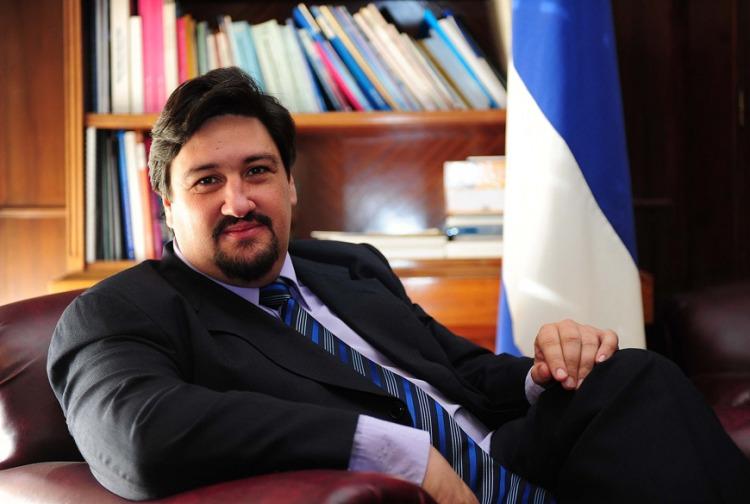POLITICA
Tras un encuentro en Casa Rosada de este lunes, H�ctor Daer, de la CGT, dio detalles del proyecto consensuado y apost� a que se apruebe en Diputados esta misma semana. Este martes seguir� el di�logo con legisladores y gobernadores.
POLITICA
El juez lo pidi� sobre Los Sauces SA y sobre la cuenta que administra M�ximo Kirchner. Se pidi� que no contin�e cumpliendo dicho rol y solicit� interventores informantes en la empresa Idea SA de Osvaldo Sanfelice, el responsable de administrar tres hoteles de la ex Presidenta y Negocios Patag�nicos, junto a otras firmas de los empresarios K, L�zaro B�ez y Crist�bal L�pez.
POLITICA
Se re�nen para hacer n�meros y el lunes visitan a los ministros Marcos Pe�a (Gabinete) y Rogelio Frigerio (Interior). El ex ministro de econom�a del kirchnerismo, Axel Kicillof, impulsor del proyecto consensuado por la oposici�n, no fue convocado a las reuniones del tigrense y el rionegrino. El nuevo proyecto podr�a convertirse en ley, el pr�ximo jueves.
POLITICA
El economista Gerardo Alonso Schwarz analiz� la realidad financiera provincial y nacional. Coloc� a la ca�da del poder adquisitivo como el principal motivo de la disminuci�n en las compras, antes que la retracci�n en el empleo. Adem�s, afirm� que es m�s cre�ble una inflaci�n del 25% antes que el 17% que anunci� el Ministro de Hacienda, Adolfo Prat Gay.
POLITICA
Los gobernadores que se comprometieron con el Ejecutivo Nacional y que acompa�aron el proyecto del Presupuesto 2017, no son garant�a y varios senadores podr�an acompa�ar el proyecto consensuado entre el massismo y el FpV en Diputados. Hasta los senadores misioneros podr�an votar divididos, con los �misioneristas� Cabral Arrechea y Sandra Gim�nez votando en contra del proyecto opositor y �Juanchi� Irraz�bal a favor de esta iniciativa. Pese a que la eliminaci�n del impuesto aplicado a los trabajadores, fue una promesa de campa�a del presidente Macri, la reforma aprobada tiene un alto costo fiscal para Naci�n y provincias.
POLITICA
El Congreso Provincial del Partido Justicialista de Misiones renov� sus autoridades, conform� adem�s el tribunal de disciplina y design� a sus congresales nacionales. El ex vicepresidente Mario �Pichi� Esper se qued� sin cargo a d�as de decir que ser�a contraproducente, mantener la alianza con el partido de la Renovaci�n. Justamente, el PJ Misionero defini� �estrechar filas con el frente gobernante aliado a nuestro proyecto, para evitar que sectores pro-macristas se hicieran del gobierno provincial�.
POLITICA
El ministro de Hacienda cuestion� la iniciativa aprobada en diputados. Se�al� que los gobernadores est�n �preocupados� y apunt� contra Massa y Bossio.
POLITICA
En la �ltima sesi�n extraordinaria del a�o, el Honorable Concejo Deliberante de la ciudad de Posadas eligi� a las autoridades que presidir�n el cuerpo durante el 2017. En este sentido, se logr� establecer un consenso para elegir por unanimidad la f�rmula compuesta por Alejandro Vel�zquez, quien continuar� como presidente del HCD, acompa�ado por Fernando Meza en la vicepresidencia primera y Daniel Amarilla en la vicepresidencia segunda.
POLITICA
�Hemos crecido y estamos trabajando fuertemente en la unidad del kirchnerismo en toda la provincia�, afirm� el dirigente del Nuevo Encuentro de Misiones, Vladimir P�rez, en el plenario que realiz� este espacio pol�tico el domingo �ltimo en la localidad de Jard�n Am�rica.
POLITICA
Los diputados provinciales Gustavo Gonz�lez, Walter Molina y Germ�n Bord�n se hicieron eco de las denuncias de los sindicatos docentes en lucha del FUTE, sobre fraude en las elecciones del CGE, y de corrupci�n en el sistema educativo. M�s all� de la legitimidad del reclamo, llama la atenci�n en que los legisladores radicales presentan una iniciativa para que el Consejo siente posici�n respecto de las graves denuncias: fue dos semanas despu�s de las primeras denuncias y a escasos d�as de abstenerse en la elecci�n de las autoridades de la Legislatura.
POLITICA
Una jueza dio curso a un recurso de amparo ante las graves irregularidades detectadas en el proceso. Por eso par� el escrutinio y orden� la resoluci�n de las impugnaciones y observaciones a la junta electoral. Todo ello fue orquestado por el oficialismo ante el temor de un resultado adverso. Es m�s, los integrantes del CGE, el gremio UDPM y los candidatos del FreTEMis salieron a festejar a cuenta al sentirse impunes. Se espera que la intervenci�n judicial re-encauce el tr�mite fraudulento.
POLITICA
Impulsada por la suba en los alimentos, se intensific� la ca�da en el poder adquisitivo en el pasado mes. De todas maneras, la medici�n del organismo que conduce Jorge Todesca, fue inferior a la del Congreso de la Naci�n, de 1,9% y a la que realiza el gobierno de la Ciudad de Buenos Aires, del 2%.
POLITICA
La justicia le deneg� el recurso para llegar a la Corte Suprema de la Naci�n, por lo que podr�a ir a juicio p�blico. El ex canciller del gobierno de Cristina Kirchner, est� imputado por ese delito por su participaci�n en el Memor�ndum de entendimiento con Ir�n.
POLITICA
El diputado provincial H�ctor �Cacho� B�rbaro, fue lapidario con el joven diputado nacional �camporista� de Misiones, a quien literalmente barri� de toda especulaci�n para una candidatura en las pr�ximas elecciones. Pero adem�s, reparti� sus dardos para varios diputados nacionales: dijo que Alex Ziegler fue p�simo como Ministro del Agro, y que Jorge Franco le enviaba a la polic�a en su contra. Adem�s, masacr� al senador Juan Manuel Irraz�bal, al se�alar que �no consigui� nada para Misiones�. Dijo que el PAyS se presentar� a elecciones como partido de distrito provincial, y aunque no descart� acuerdos con sectores como el de los �roviristas� Mar�a Losada y Hugo Escalada, no se van a enfrascar en alianzas electorales. �Se pierde mucho tiempo y no se llega a nada�, lanz�, picante. Y admiti� que el PAyS dif�cilmente pueda aspirar a una senadur�a nacional, porque �competiremos con la Renovaci�n y Cambiemos, que negociar�n entre ellos�, el reparto de los tres senadores nacionales a elegir.



POLITICA
En el bloque afirman que incluso superan los dos tercios. Los gobernadores inquietos por la miner�a.
POLITICA
El alcalde renovador K, Miguel �ngel Vargas dio la nota este domingo a la madrugada, al plant�rsele a un comisario ex jefe de la UR II, quien constat� la violaci�n del C�digo de Faltas en la recepci�n del Bachillerato Pedag�gico 1 y termin� denunciando la situaci�n ante sus superiores. El comisario V�ctor Wall tuvo un cruce con el jefe comunal renovador, quien dijo que estaba permitida la venta de alcohol y que �l �se hac�a cargo de lo que sucediera�. Y hasta la propia jueza de paz del lugar, Myriam Jacqueline Rosciszewski, estuvo presente en el lugar, pero nada pudo hacer para evitar el expendio prohibido y termin� retir�ndose del lugar.


.jpg) La Reserva San Juan pasar�a a ser un Parque Nacional
La Reserva San Juan pasar�a a ser un Parque Nacional  Cacho B�rbaro ya cerr� con Losada y Escalada
Cacho B�rbaro ya cerr� con Losada y Escalada  No saben en la Municipalidad si van a poder pagar los aguinaldos del Concejo
No saben en la Municipalidad si van a poder pagar los aguinaldos del Concejo  Arjol y Pianesi buscan definir candidaturas
Arjol y Pianesi buscan definir candidaturas  Le consiguieron "laburo" a Parra
Le consiguieron "laburo" a Parra